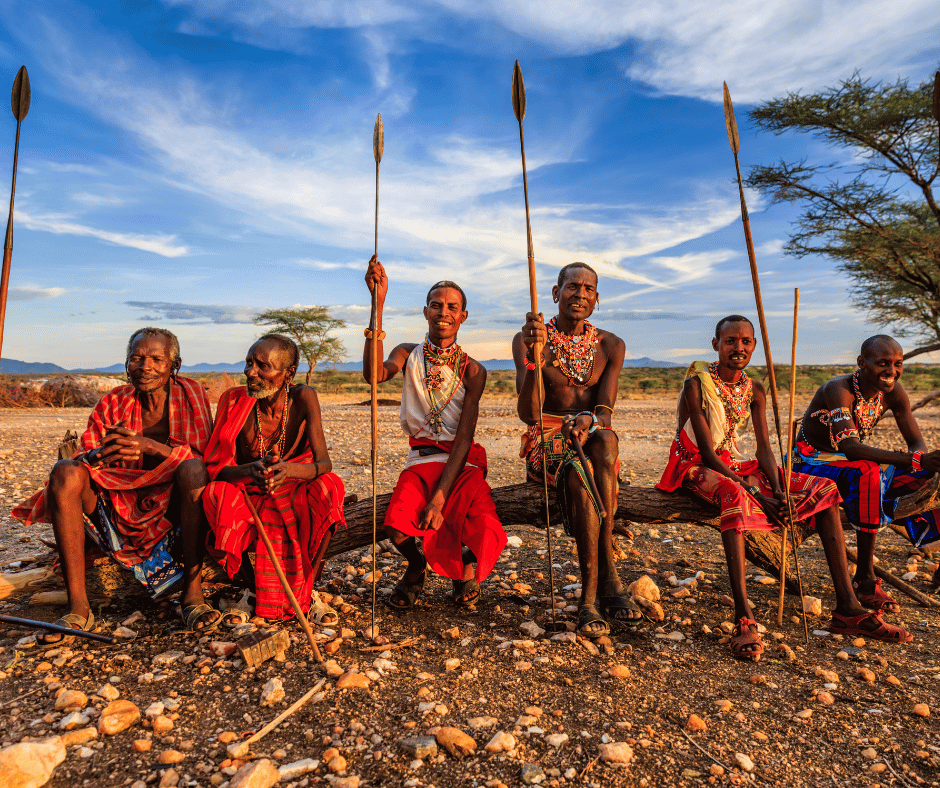Our ancestors lived healthy, stress-free lives, eating a wholesome diet, and thriving in harmony with their tribe and nature. Over millions of years, they evolved into the humans that now dominate the planet. But what can we learn from them? Despite our technological advancements and material wealth, modern society could greatly benefit from the ancestral wisdom that guided our forebears through millennia. This blog post explores the key aspects of ancestral living and challenges the contemporary obsession with material success, advocating for a redefined sense of wealth centered around social connections and meaningful living.
The Flat Hierarchy of Ancestral Tribes
In ancestral tribes, there was a flat hierarchy where no one was considered better than another. This egalitarian structure ensured that the small society remained equal and fair. Everyone had a role, and each role was valued. This lack of hierarchy fostered a sense of belonging and mutual respect, where each member’s contributions were recognized and appreciated.
The Culture of Sharing
In these tribes, sharing was a fundamental principle. After a hunt, everyone had the right to eat, not just the hunter who made the kill. This practice of communal sharing demonstrated a massive amount of support and care for each other. It ensured that no one went hungry and that resources were distributed equitably, reinforcing social bonds and collective security.

Mutual Assistance and Cooperation
Ancestral people helped each other constantly because they understood that they were stronger together than as individuals. Cooperation was key to survival, whether it was building shelters, gathering food, or protecting the tribe from threats. This sense of unity and mutual support created a resilient community where everyone thrived.
Modern Society: A Stark Contrast
Contrast this with our modern fast-paced society, which tends to idolize the richest and most successful individuals. There is an intense focus on accumulating more things and owning fancier possessions. Being rich is often equated with material wealth, leading to a relentless pursuit of success defined by financial and social status.
The Cost of Modern Success
But what does this pursuit of modern success require? It demands many people to work excessive hours every day, often at the expense of their health and well-being. Social connections are neglected, as is the simple act of helping each other and contributing to the community. This individualistic culture promotes isolation, stress, and a sense of never having enough.

Redefining Wealth: Ancestral Wisdom for Modern Living
What if we redefined what it means to be rich? Instead of measuring wealth by the number of possessions or the size of one’s bank account, we could consider the richness of our social connections, the depth of those relationships, and the sense of having time and energy to focus on deeper, more meaningful things. If you like to read more about ancient habits, read the article “The Stone Age Diet: Rethinking When We Eat, Not Just What We Eat“
Social Connections as Wealth
Our ancestors understood the importance of strong social bonds. They relied on each other for survival, creating deep, meaningful connections that provided emotional and practical support. In modern society, we can learn from this by prioritizing our relationships with family, friends, and community. Building and maintaining these connections can provide a sense of belonging and support that material wealth cannot.
Time and Energy for Meaningful Pursuits
Modern life often leaves little time or energy for activities that bring true joy and fulfillment. Our ancestors, however, lived in a way that allowed for balance between “work and leisure” (many believe that our ancestors didn’t really see hunting and gathering as a “work” but actually had a lot of fun experiences while being out searching for food, and the so called work/life balance never really existed, since everything was mixed together). They engaged in activities that were not only necessary for survival but also brought joy and satisfaction, such as storytelling, art, and rituals, both in “their free time” but also as a part of their “everyday work” when searching/hunting for food. We can incorporate this wisdom by making time for hobbies, creative pursuits, and moments of rest and reflection.
Community and Cooperation
In modern society, the focus on individual success can lead to a lack of community and cooperation. By embracing ancestral wisdom, we can foster a sense of community where mutual assistance and cooperation are valued. This can involve participating in community projects, volunteering, and supporting local businesses. By working together, we can create a stronger, more resilient society.

Health and Well-being
Our ancestors thrived on a diet of whole, unprocessed foods and lived active lifestyles. In contrast, modern diets are often high in processed foods, leading to various health issues. By adopting a more ancestral approach to diet and exercise, focusing on natural foods and regular physical activity, we can improve our health and well-being.
Embracing Simplicity
Ancestral living was characterized by simplicity. People lived with only what they needed, avoiding the excess that often clutters modern life. Embracing simplicity can reduce stress and increase our appreciation for what we have. This can involve decluttering our homes and simplifying our schedules and also focusing on experiences rather than possessions.
Additional Reading and Reach Out
If you found this article interesting, you might also enjoy reading “Stone Age Living: Could Ancient Habits Be The Key To Our Modern Health Crisis?.” For any questions or to dive deeper into these ideas, feel free to reach out via this link. Life is all about learning, and the best way to learn is through communication and debate, so please don’t hesitate to connect!
Reflection and Disclaimer
This article was written to provoke modern society norms and encourage you to reflect on your own life. While the content sometimes presents a black-and-white picture, I acknowledge that life is rarely that simple. I am not a behavioral science expert, and this article is based on personal experiences that have helped me find more fulfillment. For professional advice regarding serious health issues, please always consult medical experts.

4 thoughts on “Ancestral Wisdom vs. Modern Greed: Rethinking What it Means to be Rich”